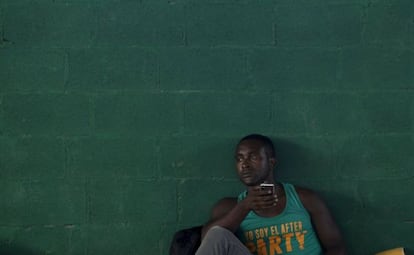Nicaragua deports hundreds of Cuban migrants back to Costa Rica
Managua accuses San Jose of violating international laws by allowing them to cross over Families are trying to reach the United States through Central America and Mexico


Nicaragua has turned back hundreds of Cuban migrants who tried to enter the country from neighboring Costa Rica as they attempt to travel to Mexico and cross into the United States.
An estimated 1,100 Cubans have arrived in Central America after reportedly flying to Ecuador and traveling by land across Colombia and into Panama.
The Cubans reportedly flew to Ecuador and traveled by land across Colombia
The Nicaraguan government of Daniel Ortega accused Costa Rica of violating his country’s sovereignty by allowing the Cubans to storm across its border on Sunday. Authorities were sent to the frontier to deport the Cubans, an action that could ignite a diplomatic crisis in the region.
“Costa Rica is neither the origin nor the destination country for the Cubans, and the government has undertaken all necessary efforts to deal with this situation responsibly under the strict guidance of international treaties,” the Costa Rican Foreign Ministry said in a statement.
The Cubans had asked Costa Rican officials for transit visas to travel to Nicaragua.
Nicaragua’s first lady Rosario Murillo, who also serves as government spokeswoman and Cabinet chief, accused Costa Rica of “failing to comply with its obligations as a state.”
While both countries accuse each other, the situation could spark a humanitarian crisis in the region as well as increase tensions between Nicaragua and Costa Rica, which are already involved in a bitter border dispute that has been taken to the International Court of Justice in The Hague.
Costa Rican Foreign Minister Manuel González Sanz said Tuesday that he has not ruled out taking the migrant problem before the Organization of American States (OAS) and other international forums. González told EFE news agency that he had spoken with OAS secretary general Luis Almagro on Sunday.
After the Cubans blocked roads at the Panamanian border, the Costa Rican government agreed on Saturday to give them seven-day transit visas so that they could move about freely.
The Cubans arrived at the border crossing at Peñas Blancas, a small hamlet used daily by thousands of Nicaraguans who cross over to Costa Rica to find work.
The Nicaraguan government closed the crossing and sent hundreds of riot police and military officers to secure the border and expel any Cubans who tried to enter.
“They threw tear gas and they beat us – they beat pregnant women and children,” said one woman. “They treated us badly; they shot their weapons. We are in a bad way and we need help.”
The situation could ignite a humanitarian crisis in the region
In a statement, Nicaraguan police said the Cuban migrants had been “hurled” over by the Costa Rican government and had entered the country by force without the proper visas.
“These actions have caused serious breaches in public order, which have also led to material damages at Nicaraguan border installations,” the police said.
Immigration sources who work at the border said they had received orders not to allow the Cubans to enter, even though the crossing was reopened by Monday – an important factor for the economies of both countries.
Ortega has been a key ally of Cuban President Raúl Castro since he returned to the presidency in 2007 and has beefed up diplomatic ties between the two countries.
Following the expulsions by Nicaragua, the Costa Rican government has said it will guarantee the “humanitarian conditions” of the migrants and was working with other countries in the region to seek solutions.
English version by Martin Delfín.
Tu suscripción se está usando en otro dispositivo
¿Quieres añadir otro usuario a tu suscripción?
Si continúas leyendo en este dispositivo, no se podrá leer en el otro.
FlechaTu suscripción se está usando en otro dispositivo y solo puedes acceder a EL PAÍS desde un dispositivo a la vez.
Si quieres compartir tu cuenta, cambia tu suscripción a la modalidad Premium, así podrás añadir otro usuario. Cada uno accederá con su propia cuenta de email, lo que os permitirá personalizar vuestra experiencia en EL PAÍS.
¿Tienes una suscripción de empresa? Accede aquí para contratar más cuentas.
En el caso de no saber quién está usando tu cuenta, te recomendamos cambiar tu contraseña aquí.
Si decides continuar compartiendo tu cuenta, este mensaje se mostrará en tu dispositivo y en el de la otra persona que está usando tu cuenta de forma indefinida, afectando a tu experiencia de lectura. Puedes consultar aquí los términos y condiciones de la suscripción digital.








































